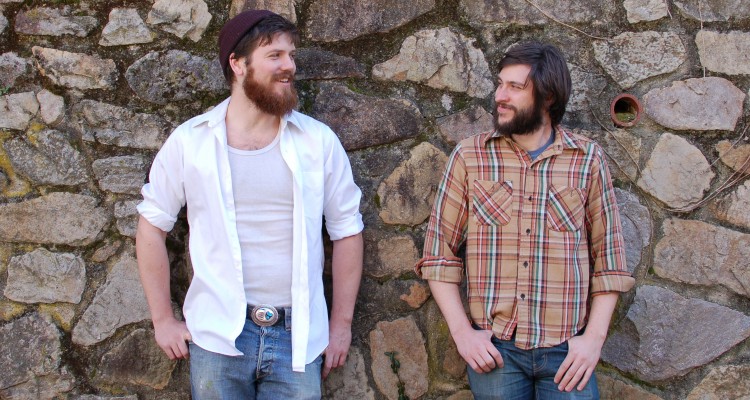Owen Lyman-Schmidt and Bobby Szafranski make up the intricate duo that is Driftwood Solider. With handmade percussion instruments, this pair multitasks multiple gadgets while creating beautiful modern folk music. For more information on Driftwood solider, check out their website. Owen has answered these questions on behalf of the duo.
Onna: To start, what inspired the name Driftwood Soldier?
Bobby: The Driftwood Soldier is a storyteller. Every struggle and tide it survives leaves another scar, another lesson, another memory. It wears those stories on its body. It whispers them between sips of whatever it’s drinking and shouts them alone in its room.
Also, when Bobby and I started playing music together, I already owned the URL, which I bought one night in a strange mood at 4 a.m.
Onna: Your instruments are so creative, do you have any plans on creating any more in the future?
Bobby: We’re always trying out new things. We like building things and we like kicking, and stomping and tapping on things. We don’t like buying things. So, yes. I think we’ll keep making new instruments and improving the instruments we have for as long as we play.
Onna: Where do your lyrics come from, how are you inspired to write a song?
Bobby: Our songs really are just stories. I’ve been writing both fiction and music for about a hundred years, and I’m not even thirty yet. Sometimes a story is best told in prose, sometimes through a song. Either way, it’s my job to provide the narrative content. Then, if it’s a song, it’s Bobby’s job to pick up the bass and make people care.
Onna: You describe your music as ‘gutter folk’, can you elaborate on how you came up with this?
Bobby: Folk music is a big umbrella. Using the term conjures up associations with traditional American musical styles, populist politics and oral history, which we appreciate, but we’re not Pete Seeger, bless his soul, or Bob Dylan, bless him too I guess… We take those familiar elements, and add bits of other music people have lost, or forgotten or thrown out, just like our percussion, and then we cram it all together the best we know how. We don’t always see a pretty world when we look out the window in the morning and we don’t always see a friend when we look in the mirror, but it’s not so bad down in the gutter. A lot of interesting things end up here. We just like to warn people they might not come out of our show squeaky clean.
Onna: Do you find that playing in a two man band has it’s limitations? Or do you prefer the two person dynamic?
Bobby: Touring in a Honda Fit has it’s limitations, but it also gets 37 miles per gallon and lets us go places and do things bigger bands can’t afford to do. Being a duo is liberating in much the same way. The low overhead and minimal logistical baggage lets us live the life we want to live and make the music we want to make. Also, even though there’s only two of us, we’ve got six or seven instruments or voices on any given song, which might test our coordination, but gives us plenty to work with creatively. There’s a DIY festival in our hometown called Two-Piece Fest that features twenty-two two-piece bands every year. People who think being in a duo is terminally restrictive should go see the amazing diversity and creativity on display among those bands.
Onna: If you could play absolutely ANYWHERE, where would you choose and why? Get as weird and creative as you’d like.
Bobby: Practically speaking, we’ve been fighting for a while now about whether to spend all of our money flying to Ireland or Alaska for a tour. Impractically speaking, I’m sad I never played a show in New Orleans before Katrina.


